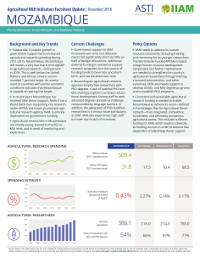Authors:
Nienke Beintema, Graça Manjate, and Kathleen Flaherty
Year:
2018
Publisher
International Food Policy Research Institute and Agricultural Research Institute of Mozambique
Back to:
Background and key trends
- Substantial, if volatile, growth in government support led to increased agricultural research spending during 2011–2015. Nevertheless, Mozambique still invests a very low share of its AgGDP in agricultural research—0.43 percent in 2016. This is well below the United Nations and African Union’s recommended 1 percent target. An assess- ment of countries with similar economic conditions indicates that Mozambique is capable of nearing this target.
- In recent years Mozambique has received little donor support. Aside from a World Bank loan supporting rice research under APPSA, the country’s principal agricultural research agency, IIAM, is entirely dependent on government funding.
- Agricultural researchers in Mozambique are mostly young, trained to the BSc or MSc level, and in need of mentoring and experience.
Current challenges
- Government support to IIAM increased over time, but disburse- ments fall significantly short (as little as half) of budget allocations. Additional external funding is needed to support research programs, but this source of funding tends to be erratic and short-term, and has declined over time.
- Mozambique’s agricultural research agencies employ few researchers with PhD degrees. A lack of national PhD and MSc training programs constrains educa- tional development, forcing staff to seek advanced degrees abroad—a challenge compounded by language barriers. In addition, the aging pool of PhD-qualified researchers is a serious issue, particularly at IIAM. IIAM also experiences high staff turnover due to lack of incentives.
Policy options
- IIAM needs to address its human resource constraints, including training and mentoring for its younger researchers. The World Bank–funded APPSA included a large human resource development component, but further mechanisms are needed to strengthen the country’s agricultural researchers through training, improved remuneration, and other incentives. UEM also needs support to develop its BSc- and MSc-degree programs and to establish PhD programs.
- Consistent and sustainable agricultural research funding is needed to enable Mozambique to achieve its vision—defined in the Strategic Plan for Agricultural Devel- opment—of an integrated, competitive, sustainable, and ultimately prosperous agricultural sector. This includes sufficient funding for IIAM, which needs to diversify its funding sources in order to become less dependent on (declining) donor support.

